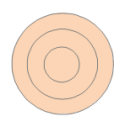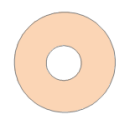Comparison of Similar Functions
This document compares similar feature editing operations.
Merge vs. Combine
- Merge applies to region layers and CAD layers (objects of the same type), while Combine applies to line layers, region layers, text layers, and CAD layers.
- Merge operates on objects of the same type to generate complex objects, whereas Combine can operate on different object types to create compounds.
- Merged objects are fused into a single simple or complex object; Combined objects form a compound block without fusion.
- Merge cannot operate on point objects, while Combine can.
- During merging, non-system fields and SmUserID field data are processed using various operations (retain first, set null, sum, weighted average). During combining, non-system fields retain SmUserID values from the object with the smallest SmID in the compound.
Move vs. Offset
- Move applies to all geometries; Offset applies to simple objects and complex objects with sub-objects, but not to CAD layer compounds.
- Move changes object positions without creating new entities, while Offset generates new parallel-shaped objects.
Split vs. Explode
- Split applies to line layers, region layers, text layers, and CAD layers; Explode applies to line layers and CAD layers.
- Split works on complex objects or compounds, while Explode only operates on line objects.
- Split decomposes sub-objects of complex objects or components of compounds into individual objects, whereas Explode breaks objects at nodes to create simple objects.
XOR vs. Donut Polygon
- XOR deletes overlapping areas between two objects and merges remaining parts; Donut polygon determines results based on intersection parity of selected objects.
Details are shown below:
Editing Operation Original Objects Result XOR Three simple objects A complex object with two sub-objects Donut Polygon Three simple objects A complex object with three sub-objects






